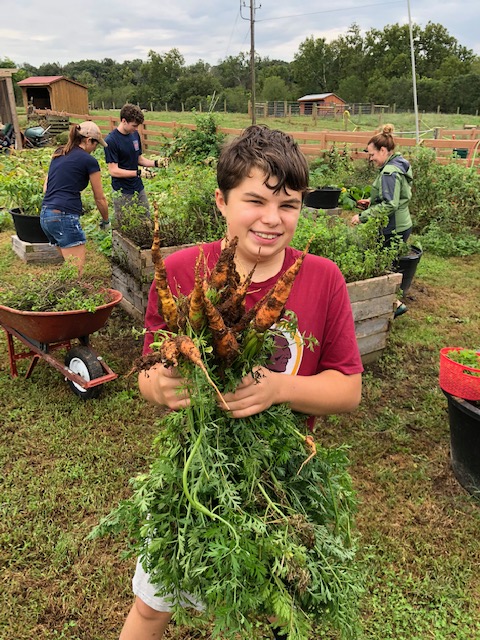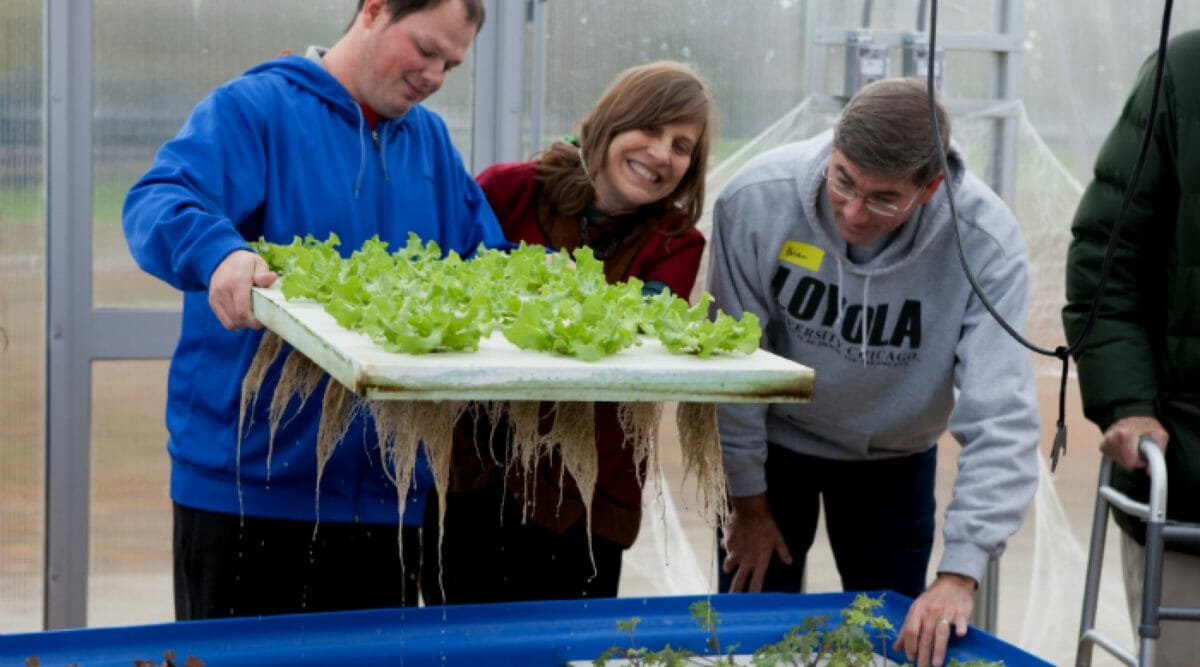Farming provides a “terrific skill match”
Step into the massive greenhouse at Lettuce Work Farms and you’re faced with leafy green plants as far as the eye can see. They range from tiny lettuce sprouts popping up in recently planted plugs to healthy greens being harvested and packaged in clear plastic containers, destined for local grocery store shelves. A small group of workers clad in white sanitary clothing are prepping the produce — and they all have autism.
Lettuce Work Farms
Lettuce Work Farms, near Columbus, Ohio, is one of a growing number of agriculture-based programs that provide opportunities for people with autism. “Our mission is to help young adults with autism develop workplace skills and find employment,” says cofounder Doug Sharp. “By working here, they can learn to work independently and develop appropriate communication and social skills.”
The farm’s 16,000-square-foot greenhouse grows leafy salad greens year-round and produces about 300 pounds of lettuce each week. The lettuce is grown hydroponically, a process that allows them to grow a lot with a small footprint, explains Sharp.
“Participants do everything, including seeding, transplanting, harvesting, packaging, cleanup, labeling and packing in boxes for distribution,” he says. “They have tasks to do every day, and it’s a good fit. Many people with autism do well with repetitive and predictable tasks — the routine nature of the work is beneficial.” Visual aids are posted throughout the greenhouse that detail step-by-step tasks for various activities.
Lettuce Work gives these workers an opportunity to be more independent. “There aren’t a lot of services available for young people with autism once they graduate from high school,” he says. “We wanted to fill that void by helping them find the next step and be successful.”
The lettuce is sold to local grocery stores. “These kids are really proud of the work they do,” says Sharp. “When they see the products on the shelves of a grocery store, it gives them a real sense of pride and accomplishment.”
The product is pretty popular with consumers, too. Kyle Baker, CEO of The Hills Market in Worthington, Ohio, says his upscale grocery store sells a truckload of Lettuce Work produce each week. “It sells really well,” he says. “We go through eight to 10 cases a week.”
Baker says that everyone who has tried the leafy greens loves them. “Once they try Lettuce Work, they stick with it,” he says. “They don’t go back to the national bagged brands.” Baker says Lettuce Work is good all around. “It’s a fresh product,” he says. “It’s a high-quality, local product, and it supports a fantastic cause.”
Legacy Farms
Legacy Farms in Virginia is a nonprofit that concentrates on hands-on garden-based training, job skills and work placement for young people and adults with autism, according to executive director Laurie Young. The farm lets participants explore opportunities to advance their education, life skills, health and well-being.

Photo by Laurie Young
“Our program centers on the garden, where they plant, tend, grow, harvest and deliver produce and flowers to the community,” says Young. “We build on what they find a natural joy in doing, from tending the gardens to interacting with customers.”
The half-acre experiential farm provides a “lovely setting,” she says. “It’s very calming to the nervous system to be in a peaceful, natural environment,” she adds. “They can relax and focus on learning.”
Bittersweet Farms
In northwest Ohio, Bittersweet Farms was founded in 1983 because no appropriate services existed for adults with autism, according to executive director Dustin Watkins. Modeled after a program in England, the farm exists to have a positive impact on the lives of individuals with autism and provide vocational training and jobs.
“The largest component is based on agriculture,” says Watkins. “We do a large community-supported agriculture [CSA] program, where many participants are employed and paid.” The CSA is the primary way that produce is distributed, putting tomatoes, potatoes, onions, peppers, cucumbers, leafy greens and melons into the hands of hungry local consumers.
Offering residential and day services, the 80-acre Bittersweet Farms has a menu of different options available, including the gardens, an animal barn, a culinary program and an art department. “The activities here are truly meaningful,” says Watkins. “This isn’t busywork. There is intrinsic meaning and value to what they do here, and everybody is part of the process.”
He adds that the program celebrates participants’ abilities and accomplishments. “Farming is intrinsically rewarding,” says Watkins. “I’ve never met an unhappy farmer.”
Green Bridge Growers
Farming provides a “terrific skill match” for those with autism, says Jan Pilarski, who, along with her son, founded Green Bridge Growers in Mishawaka, Indiana. The five-acre farm has two commercial greenhouses: One of them grows vegetables and edible flowers via the more traditional soil method; the other is an aquaponics greenhouse that grows crops like kale, lettuce and Swiss chard in a unique setup that pairs a water-based growing system with separate tanks that house fish. The plants and fish work together but are housed separately to swap nutrients and clean water.

Photo by Michelle Owen
“We take an innovative approach to growing food with aquaponics and provide jobs for those with autism,” says Pilarski. “They learn socialization, develop a professional attitude and build leadership skills and a knowledge of agriculture. We work with them to develop their potential in all we do.”
Pilarski says that the workers’ strengths, such as sticking to a routine, following instructions and going through specific steps to complete a task, are a great match. “They have a lot of opportunity to grow on the job and add to their skill base by working with plants and fish,” she says. “They are very precise — they want to make sure that every task is done 100 percent as asked, accurately and on schedule. They are very promising young farmers.”
As an educator of children with Autism and other physical and communication needs, this is incredible to know. There are those out there that want to treat them as people. Realize they are not meant to be separate or can’t contribute. There is so much value in who they are and how they are able to accomplish tasks. Best wishes to you.
I am trying to find meaningful options for my non-verbal son with autism. He just turned 18 and has a lot of promise. Thank you for this article as it was helpful in my search.
Do you know of an agriculture program in ny for teenagers and older on the spectrum which offers day or summer programs?
Where can I go to find information on how I can use my farm land to create a space for kids with autism or any kids to come and experience life in a safe environment while learning skills that will help them in the future. I use to be a teacher but now I stay home to help my husband who recently had a stroke and raise our three boys. I already grow corn, soy beans, and have a huge pumpkin patch yearly that I grow on my own. If I can share this experience with others then that would… Read more »